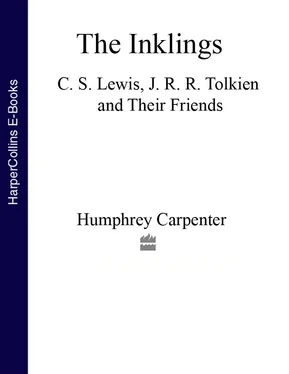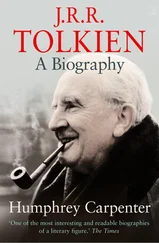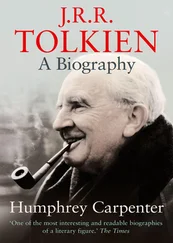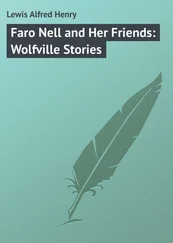The Inklings
C. S. Lewis, J. R. R. Tolkien,
Charles Williams and their friends
Humphrey Carpenter
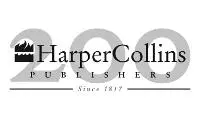
COPYRIGHT Copyright Dedication Preface Part One 1 ‘Oh for the people who speak one’s own language’ 2 ‘What? You too?’ 3 Mythopoeia 4 ‘The sort of thing a man might say’ Part Two 1 C.W. 2 ‘A tremendous flow of words’ Part Three 1 ‘They are good for my mind’ 2 ‘We had nothing to say to one another’ 3 Thursday evenings 4 ‘A fox that isn’t there’ 5 ‘Hwæt! we Inclinga’ Part Four 1 ‘No one turned up’ 2 Till We Have Faces Keep Reading Appendices A Biographical notes B Bibliography C Sources of quotations D Acknowledgements Notes Index About the Author About the Publisher
HarperCollins Publishers Ltd.
1 London Bridge Street
London SE1 9GF
www.harpercollins.co.uk
This edition 2006
First published in Great Britain by George Allen and Unwin 1978
Copyright © George Allen and Unwin (Publishers) Ltd 1978, 1981
Humphrey Carpenter asserts the moral right to be identified as the author of this work.
A catalogue record for this book is available from the British Library
All rights reserved under International and Pan-American Copyright Conventions. By payment of the required fees, you have been granted the non-exclusive, non-transferable right to access and read the text of this ebook on screen. No part of this text may be reproduced, transmitted, down-loaded, decompiled, reverse engineered, or stored in or introduced into any information storage and retrieval system, in any form or by any means, whether electronic or mechanical, now known or hereinafter invented, without the express written permission of HarperCollins ebooks
HarperCollins Publishers has made every reasonable effort to ensure that any picture content and written content in this ebook has been included or removed in accordance with the contractual and technological constraints in operation at the time of publication
Source ISBN: 9780007748693
Ebook Edition © MAY 2017 ISBN: 9780007381241
Version: 2017-05-12
Signatures of some of the Inklings, sent to Dr Warfield M. Firor in 1948, after he had given them a ham (by permission of the Trustees of C.S. Lewis)
DEDICATION Dedication Preface Part One 1 ‘Oh for the people who speak one’s own language’ 2 ‘What? You too?’ 3 Mythopoeia 4 ‘The sort of thing a man might say’ Part Two 1 C.W. 2 ‘A tremendous flow of words’ Part Three 1 ‘They are good for my mind’ 2 ‘We had nothing to say to one another’ 3 Thursday evenings 4 ‘A fox that isn’t there’ 5 ‘Hwæt! we Inclinga’ Part Four 1 ‘No one turned up’ 2 Till We Have Faces Keep Reading Appendices A Biographical notes B Bibliography C Sources of quotations D Acknowledgements Notes Index About the Author About the Publisher
Dedicated to the memory of
the late Major W. H. Lewis
(‘Warnie’)
CONTENTS
Cover
Title Page The Inklings C. S. Lewis, J. R. R. Tolkien, Charles Williams and their friends Humphrey Carpenter
Copyright
Dedication
Preface
Part One
1 ‘Oh for the people who speak one’s own language’
2 ‘What? You too?’
3 Mythopoeia
4 ‘The sort of thing a man might say’
Part Two
1 C.W.
2 ‘A tremendous flow of words’
Part Three
1 ‘They are good for my mind’
2 ‘We had nothing to say to one another’
3 Thursday evenings
4 ‘A fox that isn’t there’
5 ‘Hwæt! we Inclinga’
Part Four
1 ‘No one turned up’
2 Till We Have Faces
Keep Reading
Appendices
A Biographical notes
B Bibliography
C Sources of quotations
D Acknowledgements
Notes
Index
About the Author
About the Publisher
PREFACE
C. S. Lewis died in 1963, J. R. R. Tolkien in 1973, Charles Williams in 1945. In recent years the books of the first two have been immensely popular on both sides of the Atlantic, while Williams, though his name is far less well known, continues to exercise a considerable fascination to those who have encountered his writings.
These three men knew each other well. Lewis and Tolkien met in 1926 and soon achieved an intimacy which lasted for many years. Around them gathered a group of friends, many of them Oxford dons, who referred to themselves informally and half jestingly as ‘The Inklings’. When in 1939 Charles Williams found himself obliged to move from London to Oxford he was quickly taken into this circle, and was on close terms with Lewis and the others until his death.
The Inklings achieved a certain fame – or even notoriety, for they had their detractors – during the lifetime of the group. And when some years later it was noted that The Lord of the Rings, The Screwtape Letters, and All Hallows’ Eve (to name but three of many books) had this in common, that they were first read aloud to the Inklings, it became something of a fashion to study the writings of Lewis, Tolkien, and Williams on the assumption that they were members of a clearly defined literary group with a common aim. Such an assumption may or may not stand up to serious investigation. But in the meanwhile there has been no attempt to write any collective biography of the Inklings. This book tries to fill that gap.
It is based largely on unpublished material, and I am much in the debt of the various people who have made this material available to me. My acknowledgements to them and to the many others who have helped me will be found in Appendix D. As to quotations, their sources are fully identified in Appendix C, by a system which I feel is less intrusive than the conventional method of numerals referring to notes.
The book is largely concerned with C. S. Lewis; for, as I have argued in it, the Inklings owed their existence as a group almost entirely to him. I have also given an account, necessarily highly compressed, of the life and writings of Charles Williams. Of J. R. R. Tolkien’s life and work outside the Inklings I have said very little, because he has been the subject of an earlier book of mine, to which I have little to add.
I have tried to show the ways in which the ideas and interests of the Inklings contrasted sharply with the general intellectual and literary spirit of the nineteen-twenties and thirties. This has necessitated some discussion of their writings, particularly Lewis’s. In this sense the book sometimes strays from ‘pure’ biography into literary criticism. But I have deliberately avoided making any general judgement of these men’s achievement, for I think it is too early to try to do so. I have merely tried to tell their story.
H.C.
Oxford, 1978.
‘ O my heart, it is all a very odd life .’
Charles Williams in a letter to his wife, 12 March 1940
PART ONE
1
‘Oh for the people who speak one’s own language’
From the nursery window of the big house there could be seen a line of long, low mountains. Often the view was blurred by a slight mist, for the weather was generally damp, and on many days the sight of the hills was shut out entirely by slanting rain. Then, all that the boy could see were the wet fields that sloped down towards Belfast, where the tall cranes marked the shipyards whose hum could be heard even at this distance.
Even on wet days there was plenty to be done. Outside the nursery door were long upstairs corridors, attics to be explored, games to be played among the gurgling water-tanks where the wind blew under the slates. Or if the boy tired of that, there were pictures to be drawn and stories to be invented, and his diary of the holiday to be written up.
Читать дальше
